Investing in Australia’s top solar systems for camping could be a wise choice for frequent hikers. Besides conserving the environment, the high-end solar setup saves a lot of time and hassle. Moreover, opting for these solar panels instead of the cheap ones is a great long-term financial move.
Most newbies have problems determining camp solar panels with all the essential features for their trips. And with the many sub-standard solar panels in the market today, their chances of going for the wrong ones could never be higher.
As a result, this guide will take you through some of Australia’s best caravan solar panels. Most of the solar setups in this roundup are compact portable best for camping, and pocket-friendly.
Let’s get started with some basics!
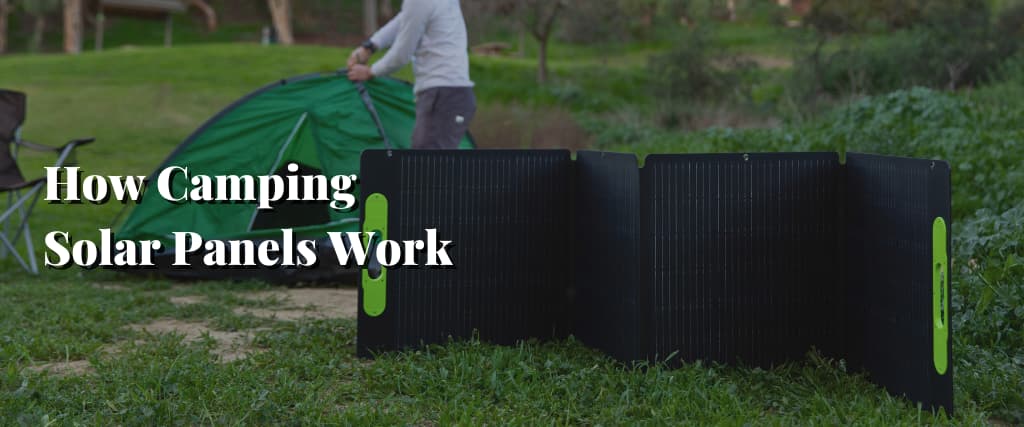
How Camping Solar Panels Work
Understanding how solar panels function is the first step in selecting the best camp solar panel.
For solar panels to function properly, they must have excellent and consistent access to sunshine.
A solar panel generates energy by letting photons free electrons from atoms. Once the power is produced, it’s typically maintained in a battery. Various panel designs are available; therefore, the best camper solar panel kit could take multiple forms. Also, solar panels can use a variety of cell types.
Tips for Buying High-Quality Portable Solar Panels
Camper solar panels are technologically complex and require more consideration and research than basic camping equipment like tents.
You’ll have to consider your budget, the nature of your camping outings, and the power you will need, among other technical factors. Some campers have bad experiences with solar panels due to inadequate preparation, which is easily avoidable with doing your due diligence.
Here are some critical factors you must consider while shopping for a camper solar panel.
1. Types Of Solar Cells
There are a couple of solars, and each is best suited for a particular region. The following is a quick rundown of portable solar panels’ most common solar cell varieties and basic information about each.
- Monocrystalline: These cells are often considered the “premium” option because they comprise a single crystal. The layout gives the electrons greater space to move, increasing electricity generation.
- Polycrystalline: These solar cells comprise several fragments of silicone fused. Because of this, Polycrystalline cells are more affordable than Monocrystalline cells. On the downside, though, they are less heat efficient.
- Thin-film: These solar cells comprise a series of interconnected layers. Although its output is less steady than that of crystalline cells, its adaptability and reduced cost make it worthwhile.
2. Flexible, Portable, or Fixed Solar Panels?
The second decision involves installing permanent panels or opting for more mobile options. As usual, there is no silver bullet when determining which model or type of solar panel is ideal for a camping trip in 2023. Read on to learn about the benefits and drawbacks of each variety:
I). Flexible Camper Solar Panels
The flexible panels can be attached to the side of a vehicle, such as a camper van or a cargo van. These solar panels can move up to 30 degrees and are most convenient when you frequently need to move your solar. In summary, they are the greatest camping solar power system if you need to cover an area with a non-flat terrain, but they come with a few drawbacks.
Highlights
- You can use them in various settings because of their reduced weight.
- Easy to set up, thanks to their lightweight
- Less efficient than permanent panels and so costlier per watt of power
- Thin protection makes them susceptible to scratching,
- come with shorter insurance.
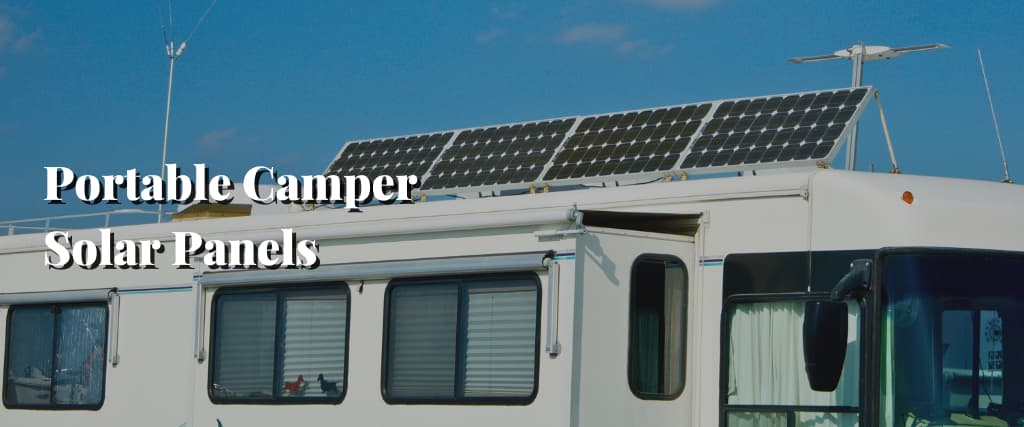
II). Portable Camper Solar Panels
If you’re not looking forward to mounting your solar panels to your campervan, you should use portable camping solar panels. They also provide an excellent first experience with solar power in the vast outdoors. They may be folded up (often in the form of a suitcase) and unfolded to display a solar panel.
Highlights
- The most effective backpacking solar panels fold up small and don’t require any sort of mounting.
- To maximise their time in the sun, you can shift them to different locations.
- The panels are prone to breaking or scratching.
- These panels cost the most for each watt of electricity produced
- Last less time than fixed ones.
Fixed Camping Solar Panels
These solar panels are the ideal choice for trailers, allowing your journey to be powered by energy from the sun. Plus, they easily attach to rooftops and stay securely in place – just like their name implies!
Highlights
- Fixed indicates a strong construction quality
- and cost-effective compared to flexible panels
- They stay in place, so there’s no setup to worry about.
- They can’t be tilted or moved to face the sun, making them less efficient.
Size And Weight
The size and weight of your solar are essential, especially if you’re not planning to permanently mount them on your campervan.
While bigger solar panels provide more energy, moving a huge one from spot to spot in the sun is not a walk in the park. The hunt for the most suitable camper solar panels shouldn’t detract from ensuring the product you end up with is a good fit.
Efficiency
Knowing how much daily power you’ll need will help you choose among the top camp solar panels. It takes 700 watts to run a 12v refrigerator, but you can get by with a much smaller (and less expensive) solar panel if you only need to charge mobile phones.
Solar cells measure efficiency in watts (such as 20W). To get a rough idea of energy output in your chosen location, multiply the watt rating by the average sunshine hours. For instance, a 20W panel with 6-7 hours of sunlight could yield 1260-1400W daily; that’s quite impressive!
Other key Features
You can receive additional functions depending on your needs and your chosen panel. You won’t need every single one, of course, but the following are a few of the more practical add-ons to keep a look out for:
- Carry Bag: A case or bag is a great way to keep your portable solar panel safe and secure while making it easier to transfer.
- LCD Screen: This will facilitate simple operation and performance monitoring
- Kickstand: This is great for maximising sun exposure on portable solar panels.
Review of the Top Solar Power Panels in Australia
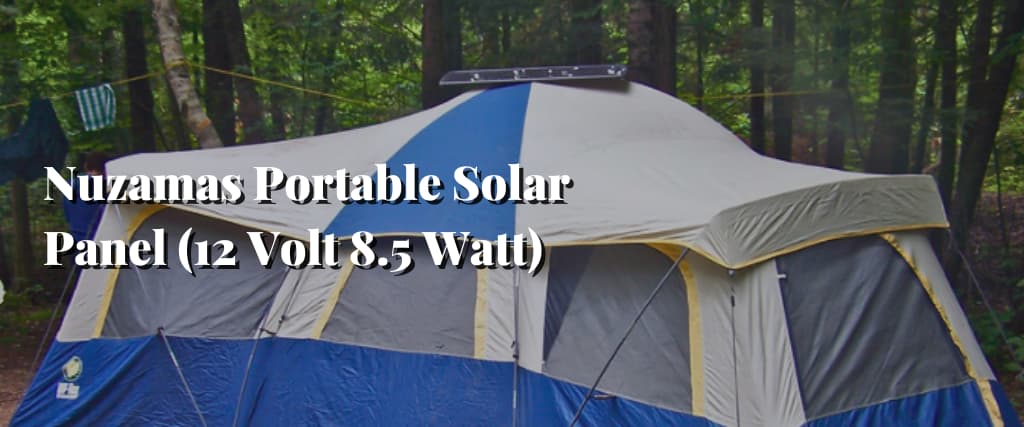
Nuzamas Portable Solar Panel (12 Volt 8.5 Watt)
Specs:
- Type: Monocrystalline
- Weight: 420g
- Output: 8.5 Watt
This could be your best option if you’re looking for a small solar panel with which you can easily travel. This solar panel sets itself apart from the competition by including suction cups that allow you to attach it to your car’s windshield. The Nuzamas solar panel can withstand harsh weather conditions and is robust enough to serve you for years.
The Nuzamas solar panel weighs only 420g, making it one of the lightest alternatives. This top-rated solar camping charger features multiple plug-in options, including a cigarette lighter, USB, and alligator clips. On an average day, the panel generates about 22 volts of electricity.
Pros:
- Weather-resistant panel
- Ultralight
- Suction cups
Cons:
- Less energy output
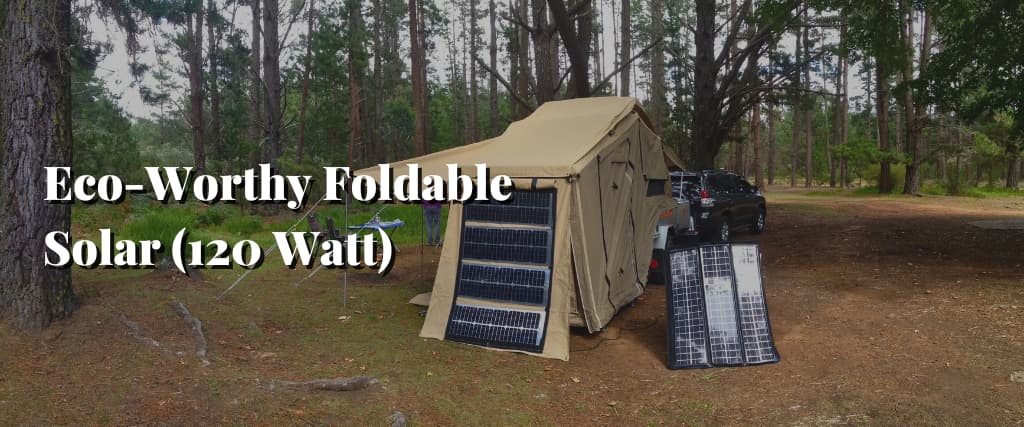
Eco-Worthy Foldable Solar (120 Watt)
Specs:
- Type: Polycrystalline
- Weight: 4.1kg
- Output: 120 Watt
The Eco Worthy is one of the best foldable Australian solar panels; you can fold it to the size of a briefcase.
The finest solar panels for RVs have a sturdy aluminium frame, so they can withstand rough treatment when camping, climbing, or trekking. It’s constructed from water-repellent oxford material and has a splash-proof exterior.
With the bracket’s adjustable angle, which you can shift thanks to its foldability, you may improve the efficiency of the conversion process. It also has two 5V USB connections to charge two items simultaneously, like your phone and a tablet computer. A three-meter connecting cable allows you to position the panel wherever you like on the roof of your camper van.
Pros:
- Very portable, can be folded into a briefcase
- USB ports (two) for charging
- Durable with aluminium
Cons:
- The kickstand feet are too short
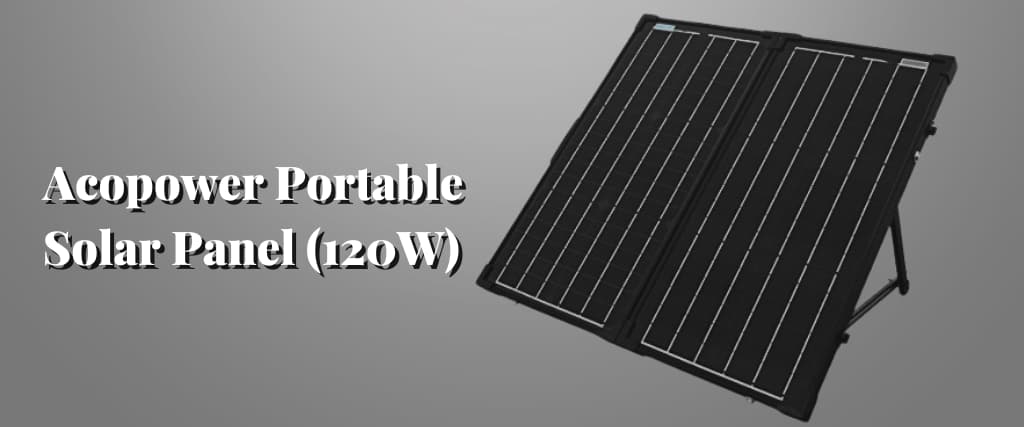
Acopower Portable Solar Panel (120W)
Specs:
- Type: Monocrystalline
- Weight: 3.8kg
- Output: 120 Watt
This could be your best option if you’re looking for pocket-friendly camper solar panels with sound power output. Besides, Acopower is a popular and reliable brand. Its panel weighs a mere 3.8 kg, making it one of the lightest solar kits currently on the market.
This solar panel uses SunPower’s monocrystalline cells to reach the highest conversion rate of up to 25%. In addition to regulating power, the LCD controller displays current consumption for monitoring.
The panel can be turned on and functioning in under a minute because everything has been pre-wired. The panels may be folded inward after usage to make it portable, and a convenient pouch stores the included extras.
Pos:
- Ultralight and very portable
- High conversion efficiency
- Pre-wired and easy to set up
Cons:
- Fragile panels cannot serve you for long
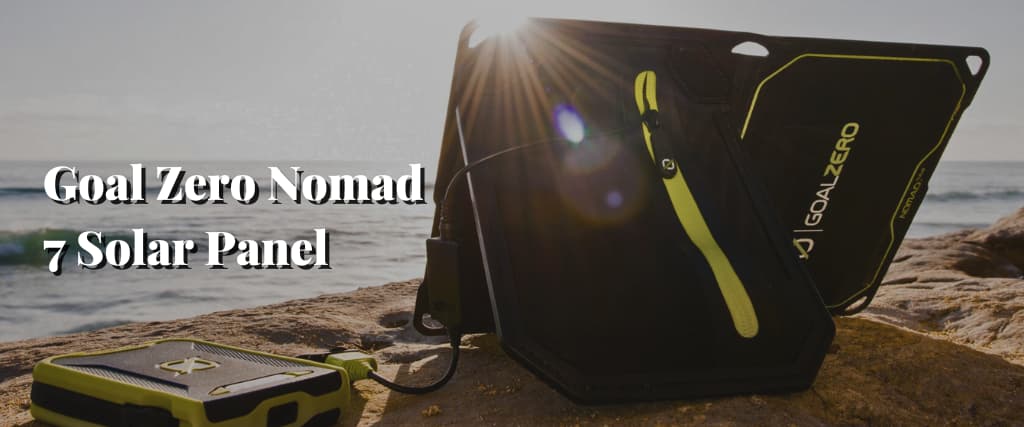
Goal Zero Nomad 7 Solar Panel
Specs:
- Type: Monocrystalline
- Weight: 453.6g
- Output: 7 Watt
With this solar panel, you can stop stressing over the power levels of your various portable electronics and focus on having fun on your vacation or adventure. If you’re shopping around for the best solar for camping, seriously consider Goal Zero. It features an LED indicator that displays how intense the sunlight is that day.
This product is both lightweight and highly functional, making it ideal for adventurers on the go. Its user-friendly design features a clip to attach easily to your bag and an adjustable panel that can be positioned with its convenient kickstand bracket – which you can remove to maximise portability. Furthermore, this device has been crafted from robust materials, so you know durability won’t be an issue!
Pros:
- Very easy to use
- The LED indicator measures the sun’s strength.
- Easy-to-detach kickstand allows for optimal panel positioning.
Cons:
- Requires direct and constant sunlight
- It takes longer to charge up
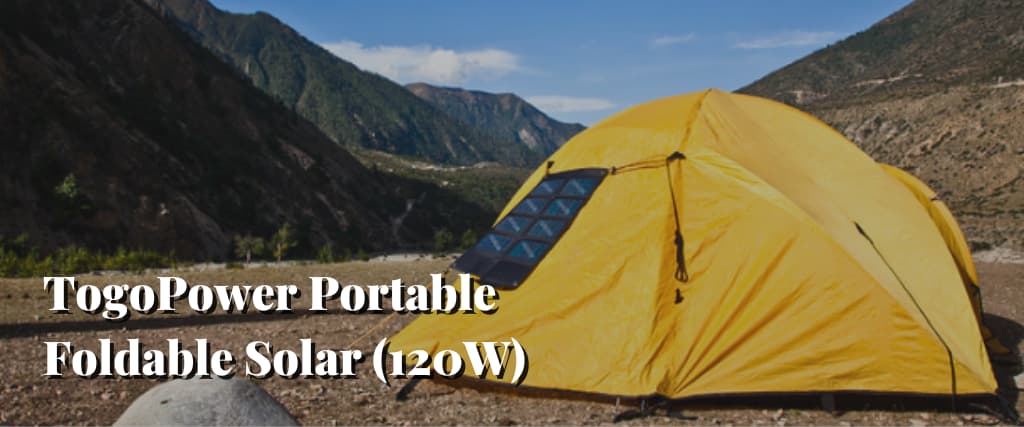
TogoPower Portable Foldable Solar (120W)
Specs:
Type: Monocrystalline
Weight: 5kg
Output: 120 Watt
The Togo Power is extremely versatile solar thanks to its extensive connectivity bandwidth and compatibility with Baldr, Goal Zero, Jackery, and Paxcess. It has a good energy conversion efficiency, operating at about 23%.
Furthermore, the Togo Power panel has an IC chip that can detect what kind of electronic equipment you’re connecting to. It safeguards against short circuits, overcharging, and overloading as well. With built-in dual USB connections, this panel is ideal as a backup power source for charging mobile devices during a blackout.
The panel can resist any climate and is extremely lightweight. The device has a warranty covering any defects for an entire year.
Pros:
- IC to detect all devices plugged in
- All-whether solar
- Dual USB ports
Cons:
- Lower wattage than advertised
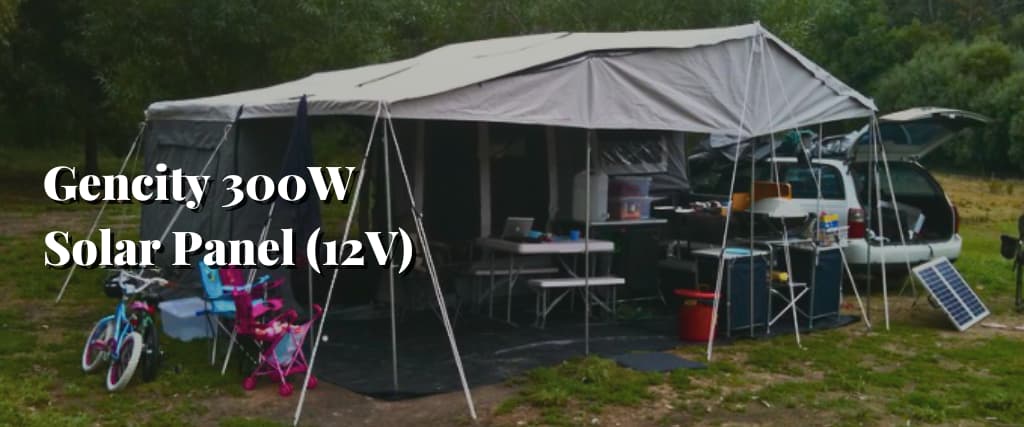
Gencity 300W Solar Panel (12V)
Specs:
- Type: Monocrystalline
- Weight: 11kg
- Output: 300 Watt
If you’re looking for a portable panel that can give a stable power supply while hiking, the Genicity 12V solar panel is a solid option. Its conversion rate is 24%, higher than the average for solar panels.
It has a robust anodised aluminium alloy frame and a high-quality curved glass exterior for optimal light transmission. Since it has a 300W energy output, you can plug in whatever gadget you like. A 20A solar controller, junction box, MC4 connectors, 1m cable, and an Anderson plug are also included.
This panel is the perfect choice if you’re looking for durable, top-of-the-line solar panels in Australia. Plus, it has a five-year warranty that offers complete protection and peace of mind.
Pros:
- High-end tempered glass
- A conversion efficiency of 24%
- Five-year warranty
Cons:
- One meter cable is limiting for most users
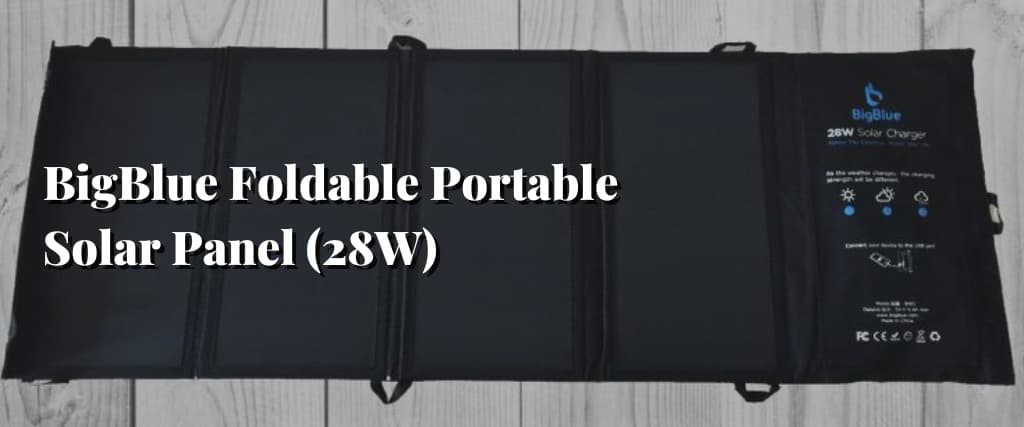
BigBlue Foldable Portable Solar Panel (28W)
Specs:
- Type: Monocrystalline
- Weight: 0.58 grams
- Output: 28Watt
The BigBlue Foldable solar is an excellent option if you still need to find a panel within your price range. The strong and resilient polymeric fabric is stitched into each panel. Then, simply fold it up and put it in a backpack for safekeeping.
Three USB connectors on these solar panels make connecting devices like speakers and power bricks easy while also charging a phone.
This panel’s 24% conversion rate makes it ideal for use in any outdoor setting; however, you cannot use it to store energy. This high-quality panel costs very little and is easy to transport because of its lightweight design (0.58 grams). It’s one of the ten greatest solar panels we provide.
Pros:
- Ultralight
- Water-resistant
- It has three USB ports
Cons:
- Charges slowly
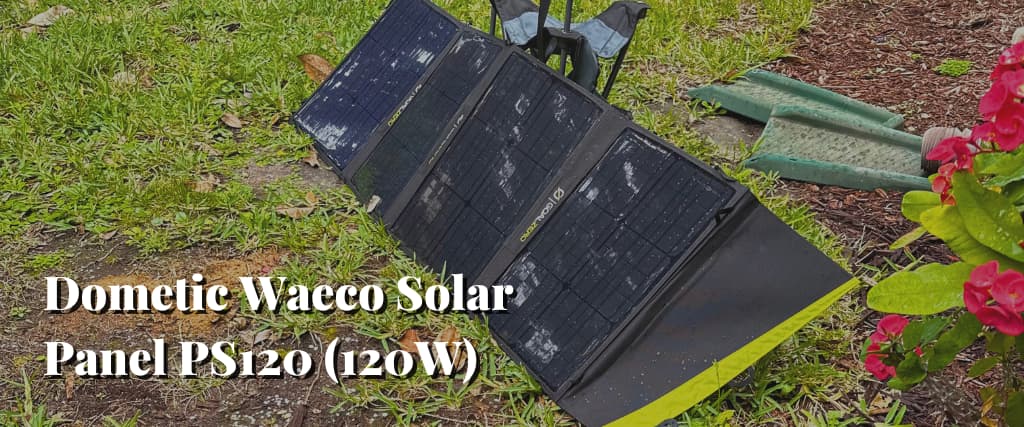
Dometic Waeco Solar Panel PS120 (120W)
Specs:
- Type: Monocrystalline
- Weight: 14kg
- Output: 120 Watt
WAECO solar panels are lightweight and portable, making them an excellent backup power source for charging batteries or electrical devices. It folds up relatively little and neatly stores away in a sturdy bag, making it convenient for future excursions.
Its high quality and strong construction stem from its use of high-performing monocrystalline silicon. The moveable feet make it easy to position the panel wherever there is access to sunlight. It also includes a heavy-duty regulator capable of handling 10 amps.
A two-year warranty backs this solar panel for your convenience and security.
Pros:
- It has monocrystalline silicon,
- Two-year warranty
- Portable and easy to fold-up
Cons:
- Heaviest than most solar panels on the list
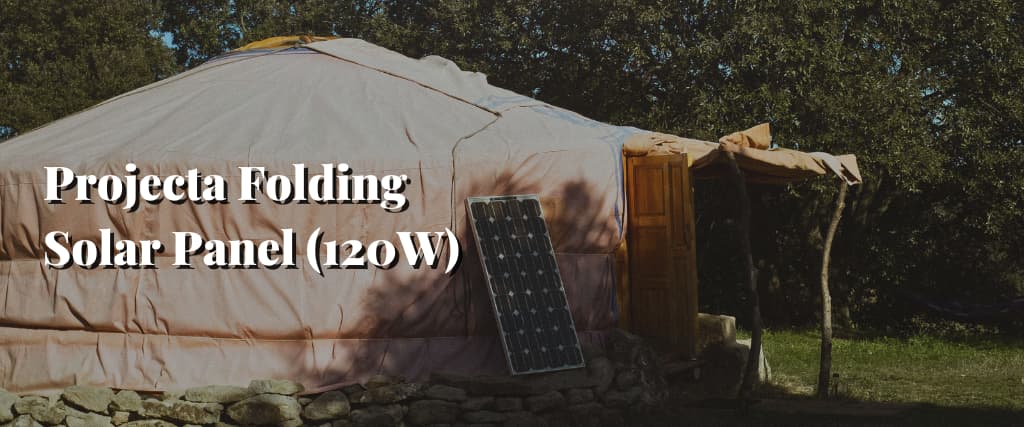
Projecta Folding Solar Panel (120W)
Specs:
- Type: Monocrystalline
- Weight: 13.8kg
- Output: 120 Watt
This solar panel could be your best fit if you want something durable yet pocket-friendly! A camper needing a battery and electronic device charger will find the Projecta 120W panel an indispensable friend.
The old edition of Projecta utilised polycrystalline equipment, whereas the modern version comprises superior monocrystalline technology. Furthermore, its sleek black frame and steel legs make it both stylish and sturdy – a significant upgrade from the aluminium framework in prior models.
There is a 5-meter cord for easy battery connection and the bi-fold panels, so you won’t have to worry about finding space. The panels can be easily transported with the help of the accompanying bag. Lastly, a solar controller safeguards your battery under peak conditions and prevents discharge in the event of sun exposure.
Pros:
- Sleek design
- Five-metre cable
- Solar controller
Cons:
- None
Conclusion
Choosing the best camp solar panels in Australia involves careful consideration of several critical variables, including efficiency, portability, longevity, and price. Solar panels have become a standard issue for campers due to the rise in popularity of camping and other outdoor activities.
Campers can reap the rewards of renewable energy without sacrificing comfort or convenience by purchasing a high-quality solar panel. With any luck, you can use the knowledge and insights gained from this article to pick out the ideal solar panel for your next road trip. Enjoy the wonders of nature while leaving as little of a footprint as possible by prioritising security and environmental responsibility in your camping trips.
